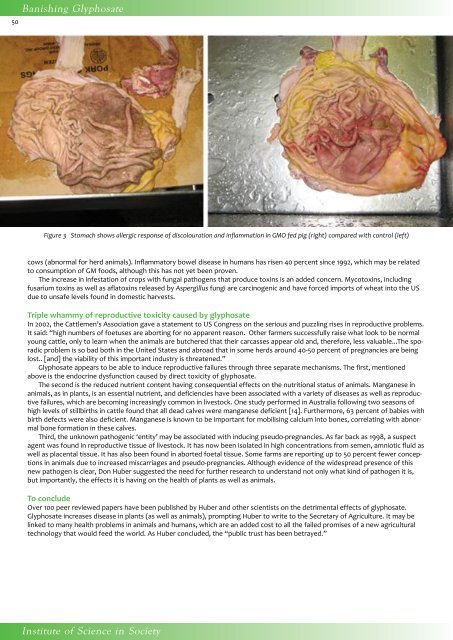Banishing Glyphosate
BanishingGlyphosate
BanishingGlyphosate
You also want an ePaper? Increase the reach of your titles
YUMPU automatically turns print PDFs into web optimized ePapers that Google loves.
50<br />
<strong>Banishing</strong> <strong>Glyphosate</strong><br />
Figure 3 Stomach shows allergic response of discolouration and inflammation in GMO fed pig (right) compared with control (left)<br />
cows (abnormal for herd animals). Inflammatory bowel disease in humans has risen 40 percent since 1992, which may be related<br />
to consumption of GM foods, although this has not yet been proven.<br />
The increase in infestation of crops with fungal pathogens that produce toxins is an added concern. Mycotoxins, including<br />
fusarium toxins as well as aflatoxins released by Aspergillus fungi are carcinogenic and have forced imports of wheat into the US<br />
due to unsafe levels found in domestic harvests.<br />
Triple whammy of reproductive toxicity caused by glyphosate<br />
In 2002, the Cattlemen’s Association gave a statement to US Congress on the serious and puzzling rises in reproductive problems.<br />
It said: “high numbers of foetuses are aborting for no apparent reason. Other farmers successfully raise what look to be normal<br />
young cattle, only to learn when the animals are butchered that their carcasses appear old and, therefore, less valuable...The sporadic<br />
problem is so bad both in the United States and abroad that in some herds around 40-50 percent of pregnancies are being<br />
lost.. [and] the viability of this important industry is threatened.”<br />
<strong>Glyphosate</strong> appears to be able to induce reproductive failures through three separate mechanisms. The first, mentioned<br />
above is the endocrine dysfunction caused by direct toxicity of glyphosate.<br />
The second is the reduced nutrient content having consequential effects on the nutritional status of animals. Manganese in<br />
animals, as in plants, is an essential nutrient, and deficiencies have been associated with a variety of diseases as well as reproductive<br />
failures, which are becoming increasingly common in livestock. One study performed in Australia following two seasons of<br />
high levels of stillbirths in cattle found that all dead calves were manganese deficient [14]. Furthermore, 63 percent of babies with<br />
birth defects were also deficient. Manganese is known to be important for mobilising calcium into bones, correlating with abnormal<br />
bone formation in these calves.<br />
Third, the unknown pathogenic ‘entity’ may be associated with inducing pseudo-pregnancies. As far back as 1998, a suspect<br />
agent was found in reproductive tissue of livestock. It has now been isolated in high concentrations from semen, amniotic fluid as<br />
well as placental tissue. It has also been found in aborted foetal tissue. Some farms are reporting up to 50 percent fewer conceptions<br />
in animals due to increased miscarriages and pseudo-pregnancies. Although evidence of the widespread presence of this<br />
new pathogen is clear, Don Huber suggested the need for further research to understand not only what kind of pathogen it is,<br />
but importantly, the effects it is having on the health of plants as well as animals.<br />
To conclude<br />
Over 100 peer reviewed papers have been published by Huber and other scientists on the detrimental effects of glyphosate.<br />
<strong>Glyphosate</strong> increases disease in plants (as well as animals), prompting Huber to write to the Secretary of Agriculture. It may be<br />
linked to many health problems in animals and humans, which are an added cost to all the failed promises of a new agricultural<br />
technology that would feed the world. As Huber concluded, the “public trust has been betrayed.”<br />
Institute of Science in Society


